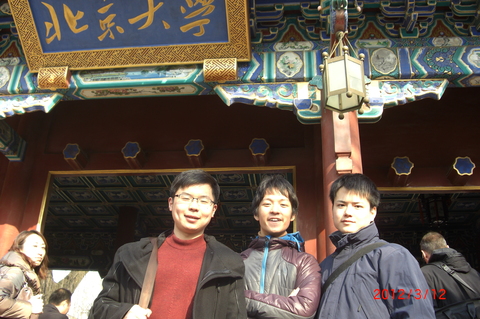Campus Asia Student Workshop in Seoul & Beijing
Workshop Report
I took part in Campus Asia Workshop from March 9 to 12, 2012. At Seoul National University, the main discussion topic was the possibility of integration of Asian countries, especially Japan, Korea, and China. At Peking University, we focused on energy policy. Although it was a short stay at each university, I had a fruitful experience during the trip.

What I learned in the workshops
I found two prominent attitudes which I should acquire. One is their eagerness towards studying. I am sure that the number of Chinese and Korean who can speak Japanese is far more than that of Japanese who can speak Chinese or Korean. In both universities, not only were many participants capable of speaking Japanese fluently, but they also enthusiastically sought to learn Japanese from us even at the breaks between the sessions. As their language abilities helped deepen my understandings in the sessions, I am inspired and determined to study Chinese like them before my exchange study to Peking University.
Another attitude I witnessed was their warm hospitality. The students in Peking University and Seoul University took care of us at most occasions: workshops and campus tour at school, and sightseeing and dinner in town. They even came to our hotel in the morning to pick us up, took us on special tours and explained about many sights and their culture.
What I expect (to learn) from Campus Asia Program
I am going to study at Peking University from August 2012 and Seoul University from March 2013 as a participant in Campus Asia Program. I expect two things from Campus Asia Program.
The first is to have better understandings about “Mysterious China”. There are many discussions about China in Japan of which the reasoning seems unclear and uncertain to me. Through studying and living in China, I would like to broaden my knowledge about Chinese culture and be able to make correct and rational critique.
The second is to be able to consider Japan-China relation from the Korean perspective. At the workshop in SNU this March, a professor mentioned that Korea can be a bridge between China and Japan not only geographically but also politically. It is a shame that I have not considered such an idea before, but I am sure that I will be able to see the relations among Asian countries more relatively by standing on other country's point of view through my studies at SNU.
今回Campus Asia Workshopに2012年3月9日~13日まで参加しました。ソウル大学とのワークショップではアジア、とりわけ日中韓3カ国の統合について、北京大学とのワークショップではエネルギー政策についての議論が交わされました。短い期間でしたが、非常に濃密な時間を過ごすことができました。
ワークショップでの学生交流によって得たもの
ワークショップや、その他の場面での学生交流によって、見習いたいところを2つ見つけました。
1つは向学心です。日本語のできる中国人・韓国人は、中国語・韓国語のできる日本人よりもはるかに多いでしょう。両大学では、参加者の多くが日本語を話すことができましたが、さらにワークショップの合間も日本語をより学ぼうとする意欲にあふれていました。メモ帳を常に片手に話していた方もいたほどです。私も今夏に渡航するまでには中国語を、彼らの操る日本語と同じくらい流暢なものにしていくための行動を起こそうと決意しました。
もう1つはおもてなしの心です。北京大学とソウル大学の学生には、ワークショップのみならず、キャンパスツアーや、食事、観光にも同伴していただきました。行く先々では丁寧な解説をしてくれましたし、朝起きるとホテルまで出迎えにきてくれました。そのことにより、大学のみならず、ソウル・北京の都市環境も少し理解することができました。東大に戻って、自分たちも外国人学生に対して同様に接さなければと思いました。
Campus Asia Programに期待すること
私はCampus Asia Program1期生として2012年8月から北京大学・2013年3月からソウル大学で学びます。そこで私が期待することは2つあります。
1つめに、「よくわからない国中国」の理解を少しでも深めることです。とかく中国にまつわる言説には、真偽のほどがわからないもの・陰謀論めいたものが多いと感じています。中国に行って現地の価値観や授業を通じ、それらを批判的に捉えることのできる基盤を持つとともに、西洋諸国とは異なる独自の思想を持つ部分・共通の部分について考えていこうと思います。
2つめに、韓国から日中関係を考えることです。今回のワークショップで、ソウル大学の教授が「韓国は日中のつなぎ役となることを目指す」とおっしゃっていたのが印象的でした。恥ずかしながらこれまで日本にいた自分にはなかった視点であり、韓国での学びによりアジア各国の関係を相対的に見られると期待しています。

